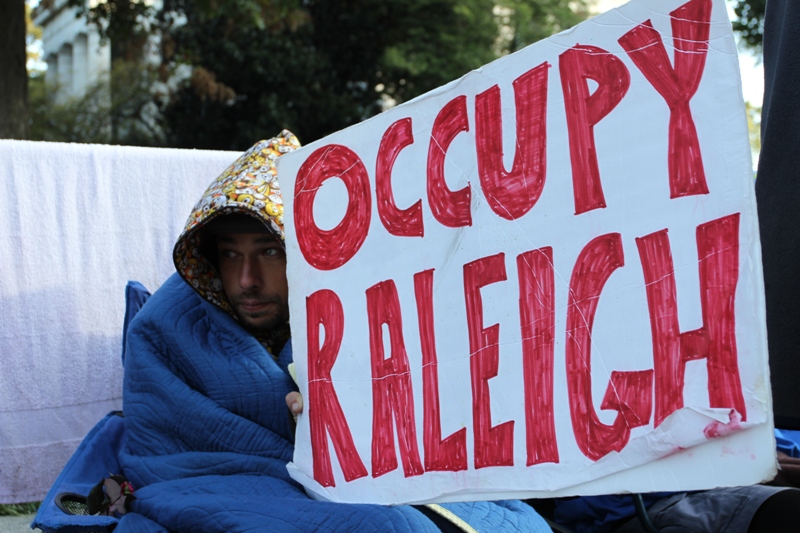Occupy Raleigh protesters might be spending more time on the sidewalk after members of a city committee denied the group’s request for use of a city-owned park.
Members unanimously voted Tuesday against the use of a public facility for overnight camping and encouraged the group to seek a privately-owned location.
Raleigh’s Occupy protest is part of a national movement of 24-hour protests that began with Occupy Wall Street in New York. Since Oct. 15, Occupy Raleigh has set up a small encampment on the sidewalk along Morgan Street aside the Old State Capitol building. Twenty-eight people have been arrested since the protest began in Raleigh, first for refusing to leave Capitol grounds during the initial protest, then for refusing to get out of chairs on the sidewalk two weeks ago.
Mayor-elect Nancy McFarlane has been working behind the scenes to find a suitable location for the group that is not on public property, according to Councilor Mary-Ann Baldwin, who chairs the council’s Law and Public Safety Committee.
The city council will vote on the recommendation at its next meeting Nov. 15.
“I’m disappointed with not getting public property,” said Joseph Huberman, the official spokesman for Occupy Raleigh. “But I’m encouraged that the mayor elect thinks that it’s important that we have a space and that she’s going out of her way personally to help negotiate a space for us to be in.”
Huberman said efforts to find a private location have been unsuccessful.
Members of the movement were asking for the use of a small park behind the municipal center between Dawson Street and the parking deck, at the intersection of Morgan Street. The park was to serve as a place to eat, sleep and use the bathroom with the use of a portable toilet.
The group also wanted access to a electrical outlet and the municipal building’s rotunda for shelter during inclement weather.
Concerns of Violence
One reason for the denial is fear of crime activity. Violence has escalated in some Occupy cities, such as Oakland, Calif.
Raleigh Resident Amanda Nixon attended Tuesday’s meeting to oppose allowing the protestors to set up camp on city property. Nixon said that she witnessed significant violence around the Occupy protest in Washington, D.C.
But, she said she felt members of the Occupy Raleigh movement are mostly upstanding citizens. Her fear, she said, is when the movement grows.
Huberman said he is disappointed to hear fear from residents.
“We need to work with the community so that we can eliminate these unfounded fears that were expressed today,” he said.
Protester Kurt Zehnden, who has been sleeping on the sidewalk, said he has witnessed very few problems. He recounted one incident late at night involving a small group of Marines who approached the group. No violence resulted from the altercation because of how protesters handled themselves, he said.
“We’ve been peaceful,” said Zehnden, a waiter at a local restaurant.
He said the group’s willingness to cooperate with city and police officers demonstrates their interest in behaving as good neighbors.
Cost Concerns
The other concern brought up during the meeting is the cost associated with the use of public facilities. Assistant City Manager Daniel Howe said the city has spent $61,000 to pay police since the protest began on Oct. 15 in front of the Capitol building. Howe also said he no longer felt there was a need for such a high level of coverage by officers.
Twenty-four hour security would cost the city about $500 a day, using the city’s private security firm. If the city were to use Raleigh police officers, it would cost between $400 and $800 per day.
The city already allows any group to protest on city sidewalks and in city parks, but the issue is the overnight stay.
Legal Concerns
City-run parks in Raleigh generally close at dusk and don’t allow overnight camping, with the exception of Durant Nature Park, which has overnight facilities. These facilities are used on a rental basis.
If the city were to allow the use of the park, it would require a change of city policy and a rental fee schedule would have to be put in place. Renters would also have to provide liability insurance.
While the municipal building is a public facility and holds public meetings, the building is not accessible by the public at all hours for security reasons. Allowing the group to use the building would also require a change of city policy.
If the city changed the policy based on First Amendment rights, Howe said, “it would be virtually impossible to reverse.”
Councilor John Odom said that he felt there were enough rules in place to make it possible for the group to express their right to freedom of speech, but said that allowing a group to occupy it in this manner would be a big mistake.
He added that of the 1,300 people that signed a petition for the space, only 216 of them lived in Raleigh.
Most protesters were working during Tuesday’s 9 a.m. meeting and unable to attend. Huberman said he will present the news to the Occupy group tonight for discussion.
“I think it was fear,” Huberman said of the reason for the outcome. “I think it was fear about what would happen in the future, fear about what is happening in other places and I think fear generates more fear.”
